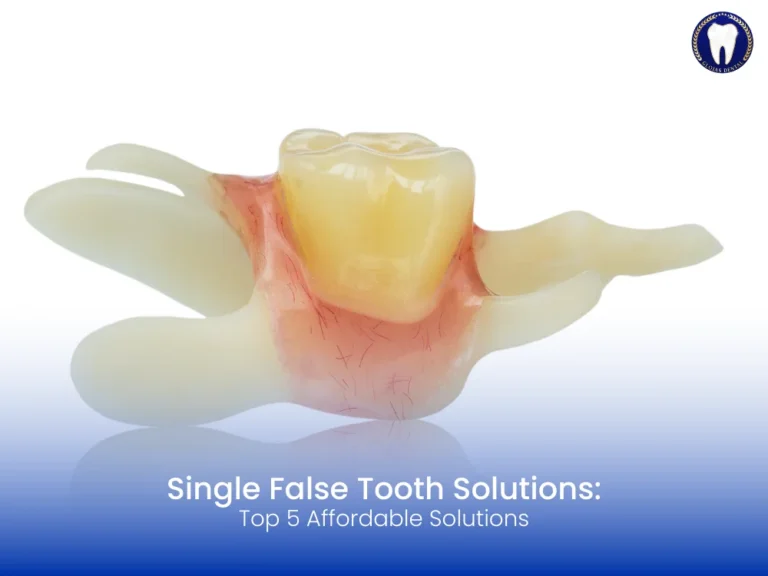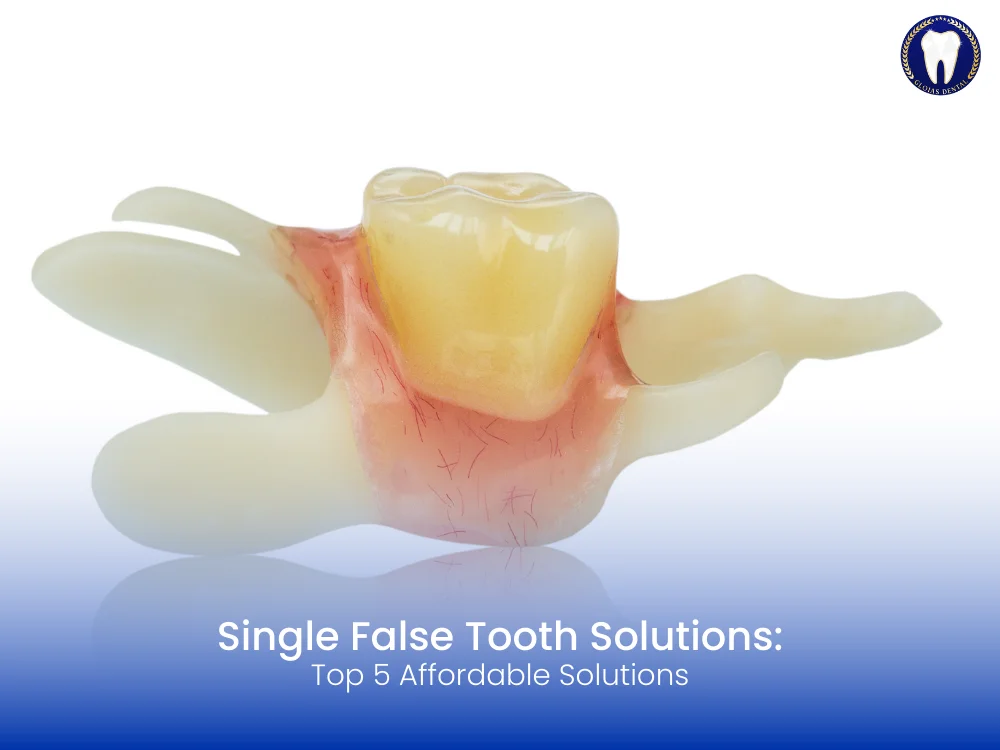Losing a tooth—whether due to trauma, decay, or extraction—can feel disheartening. But don’t worry, replacing a missing tooth doesn’t have to be complicated or costly. Whether you’re aiming to regain your confident smile or restore chewing function, a single false tooth could be the ideal solution.
From removable options to permanent fixes, modern dentistry offers a variety of effective methods for replacing one missing tooth. In this article, we’ll walk you through the top single false tooth options, their pros and cons, pricing, and how to care for your replacement tooth to ensure long-lasting results.
What Is a Single False Tooth?
A single false tooth, also known as a dental prosthetic or tooth replacement, is designed to fill the gap left by a missing natural tooth. It restores function, prevents teeth from shifting, and improves aesthetics.
Unlike full dentures, which replace all teeth in an arch, a single false tooth is used when only one tooth is missing. Depending on your preferences, budget, and oral health, there are various solutions to choose from.
Top 5 Single False Tooth Replacement Options
Dental Implant: The Premium Solution
A dental implant is considered the gold standard for replacing a single missing tooth. It involves surgically placing a titanium post into the jawbone, which acts as a root. A crown is then attached to replicate the look and function of a natural tooth.
Pros:
- Permanent and durable
- Looks and feels like a natural tooth
- Stimulates jawbone to prevent bone loss
Cons:
- Higher cost
- Requires minor surgery
- Longer healing time (3–6 months)
Cost Estimate: $3,000–$5,000
Dental Bridge: A Fixed but Less Invasive Option
If you’re not a candidate for implants or prefer a non-surgical solution, a dental bridge may be ideal. A bridge uses adjacent teeth as anchors and places a false tooth (pontic) in the middle to “bridge” the gap.
Pros:
- No surgery required
- Faster than implants
- Blends well with natural teeth
Cons:
- Requires shaping of neighboring teeth
- May not last as long as an implant
Cost Estimate: $2,000–$4,000
Removable Partial Denture: Budget-Friendly Option
A removable partial denture is one of the most affordable ways to replace a single tooth. It consists of a plastic or metal framework with a single false tooth and clasps to hold it in place.
Pros:
- Economical
- Non-invasive
- Quick to fabricate
Cons:
- Less stable than permanent options
- Needs to be removed for cleaning
- May feel bulky
Cost Estimate: $300–$1,000
Valplast Denture: Flexible and Aesthetic
A Valplast single tooth denture is a more flexible version of a partial denture, made from nylon-based thermoplastic. It’s ideal for those looking for a more discreet and comfortable removable option.
Pros:
- Flexible and comfortable
- No metal clasps
- Blends well with gums
Cons:
- Not as durable as metal-based dentures
- Can’t be relined like acrylic options
Cost Estimate: $400–$900
Flipper Tooth: Temporary and Convenient
A flipper tooth is a lightweight acrylic denture used as a temporary single false tooth replacement. Often used while waiting for an implant, it’s an affordable and fast solution.
Pros:
- Very affordable
- Quick to make
- Good temporary option
Cons:
- Fragile
- Not ideal for long-term use
- May be uncomfortable
Cost Estimate: $250–$500
Why Replace a Single Missing Tooth?
Leaving a gap in your mouth may seem harmless, but it can lead to several oral health issues:
- Shifting of Surrounding Teeth: The gap can cause nearby teeth to move, affecting bite alignment.
- Bone Loss: The jawbone may deteriorate in the absence of stimulation from a tooth root.
- Aesthetic Concerns: Missing a tooth, especially in the front, can affect your confidence.
- Chewing and Speech Issues: One missing tooth can disrupt chewing efficiency and even cause lisping or speech difficulties.
What to Consider Before Choosing a Single False Tooth Option
Before selecting the right single false tooth solution, consider the following:
- Budget: Implants are more expensive, but they offer long-term value.
- Time Frame: Need something quick? Go with a flipper or partial denture.
- Oral Health: Implants require sufficient jawbone and healthy gums.
- Aesthetic Needs: Valplast and implants offer the most natural appearance.
- Durability: Implants and bridges last longer than removable options.
Caring for Your Single False Tooth
To ensure your replacement lasts and remains comfortable, follow these simple care tips:
- Brush twice daily using a soft-bristled toothbrush
- Floss gently around the restoration
- Remove and clean dentures daily with appropriate solutions
- Visit your dentist regularly for adjustments or professional cleanings
- Avoid hard or sticky foods if wearing a denture or flipper
FAQs About Single False Tooth Replacement
1. What is the best option for a single false tooth?
Dental implants are often considered the best due to their longevity and natural appearance, but cost and oral health may guide your choice.
2. How long does a single false tooth last?
Implants can last 20+ years, while dentures and flippers usually need replacement or adjustment every 5–10 years.
3. Can a single false tooth be removed?
Yes, removable options like flippers and Valplast dentures can be taken out, while implants and bridges are fixed.
4. How long does it take to get a single false tooth?
Dentures and flippers may take 1–2 weeks, while implants can take 3–6 months due to the healing process.
5. Will people notice I have a false tooth?
Modern single false tooth options are highly realistic. With proper fitting and color-matching, most people won’t notice.
6. Is it painful to get a single false tooth?
Implants involve minor surgical discomfort, but other options are non-invasive and pain-free.

